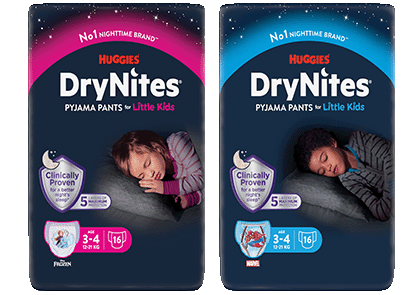While some children sail through potty training and are then able to get themselves to the loo on time, other children really struggle with knowing when it’s time to visit the bathroom, especially at night.
Going through a patch of bedwetting can be difficult and upsetting for your child, but try to remember: it’s a developmental phase.
We spoke to Paediatric Consultant Silvia Pierini about when bedwetting tends to stop. Read on to find out all you need to know about when your child should stop bedwetting, and the average age to stop wetting the bed.
At what age should bedwetting stop?
“Bedwetting—also known as night-time incontinence or nocturnal enuresis —is something that many children go through at one time or another. For some, though, it can become a difficult patch of their childhood,” explains Silvia.
The age at which bedwetting stops is different for every child and generally speaking, there is no single answer.
However, there do seem to be some patterns and causes, so having the knowledge of this medical condition can help you support your child through this.
If your child is having the odd occasion when they wet the bed and they are five years old or younger, you really don’t need to be worried about it.
A child of this age and younger may have mastered potty training or may have taken their time to get this skill just right but they are still learning to make the connection between the brain and the bladder that they need to use the loo. This is especially true at night.
When do children outgrow bedwetting?
Although the average child will master using the loo in the daytime by the time they are four, bedwetting can continue until they are older—but as they do, bedwetting does becomes less common. At the age of five, 15% of all children wet the bed. Once they are older than five, this then starts to be considered a medical condition. However, even without any medical intervention, that percentage drops to just 2% by the age of 15 years old.
If you have any concerns that there may be a physical reason why your child finds it difficult to use the loo consistently, you should visit your GP.
They can rule out any problems that might be having an effect on your child. These might include diabetes and constipation.
By the way, did you know that boys are twice as likely as girls to wet the bed? Children with developmental delays and emotional and behavioural problems may also wet the bed more often.
Children may revert to being wet at night due to an emotional disturbance. This can include a house move, their parents having relationship problems or separating or if they are having problems at school.
No matter how old your child is, bedwetting can be managed
It can be difficult to get through nights when your child has an accident, as everyone's a little short on sleep. But rest assured that this should pass and your child should soon be able to last the night without wetting the bed.
If you’re worried and your child is older than five years, it might be a good idea to have a chat with your GP or speak to a bedwetting specialist to see if there are some tips and tricks you can use to help your child get through the night.
We have lots of helpful features to help you through this stage—from advice on how to support your bedwetting child to top tips for school trips if your child isn’t dry at night yet. Sit back, have a read with a cup of tea and absorb all you can on how to manage your child’s bedwetting.
Meanwhile, wearing a pair of DryNites® Pyjama Pants will make sure your child can sleep through if they do have an accident, and wake up worry-free.




 your parenting partner
your parenting partner